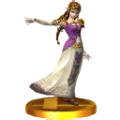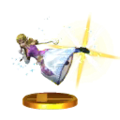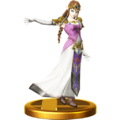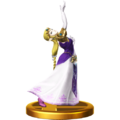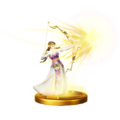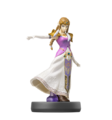Zelda (SSB4)
| Zelda in Super Smash Bros. 4 | |
|---|---|
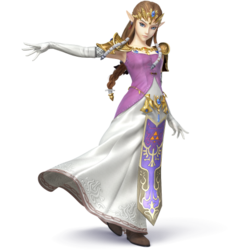 
| |
| Universe | The Legend of Zelda |
| Other playable appearances | in Melee in Brawl in Ultimate |
| Availability | Starter |
| Final Smash | Light Arrow |
| Tier | G (53) |
Zelda (ゼルダ, Zelda) is a playable character in Super Smash Bros. 4. Her return to the series was announced in a Director's Room Miiverse post on December 26th, 2013, which also commemorated The Legend of Zelda: A Link Between Worlds being released in Japan on the same day.
Jun Mizusawa reprises her role as Zelda's voice actor, albeit via recycled voice clips from Super Smash Bros. Melee and Super Smash Bros. Brawl.
Zelda is ranked 53rd out of 55 on the tier list, so she is placed in the G tier, which ties her with Ganondorf. This is similar to her placement in Brawl, where she was ranked 37th out of 38. Zelda's combo game has noticeably improved, largely thanks to improved frame data and altered knockback. When coupled with her overall high damage output, Zelda is now capable of racking up an impressive amount of damage at a respectably fast rate, much like her ancestor in Super Smash Bros. Melee.
Zelda also boasts an array of KOing options, most notably her forward smash, up smash, sweetspotted Lightning Kicks, up aerial and sweetspotted down aerial. By extension, Farore's Wind has been strengthened to the point that it can now reliably KO any character below 100% while near the upper blast line, which makes it especially potent from out of shield.
However, Zelda's weaknesses have been largely retained. Her slow mobility and situational projectiles result in both her neutral game and approach still being poor. Additionally, her endurance is still poor because of the problematic combination of her tall hurtbox, light weight, and floatiness. Lastly, Zelda's KO potential is still inconsistent: her strongest attacks have short durations and are further burdened with either abysmally weak sourspots, punishable amounts of lag, or both.
As a result of Zelda's glaring flaws, she has garnered extremely minimal representation in competitive play and, in turn, extremely sparse results. However, Zelda has nevertheless managed to find a few instances of success, thanks to the likes of ven, Fairess, Purple Guy, Onpu, and Zolda.
Attributes
Zelda is a tall, floaty lightweight with largely slow mobility. Although her traction is average and her air speed is slightly above-average, her walking, dashing and falling speeds; gravity; air acceleration; and jump and double jump are each below-average. As a result of her attributes, Zelda's endurance, neutral game and approach are sub-par.
Zelda's playstyle is largely defensive, and benefits from her strong out of shield options and punishment potential. By extension, her special moveset supplements her defensive potential, with Farore's Wind being her most effective special move. It is a long-ranged teleport that grants intangibility, giving her a very reliable and, when used wisely, virtually unpredictable recovery option. In addition, Farore's Wind has become one of Zelda's most viable KOing options, especially from out of shield: its disappearing hitbox now launches opponents directly upward, which allows it to combo into its now stronger reappearing hitbox that, when sweetspotted, will KO any character below 100% while near the upper blast line.
Due to losing Transform, Zelda has a received a new down special called Phantom Slash. Phantom Slash is a chargeable projectile that boasts both offensive and defensive capabilities: it possesses enough power to KO at reasonable percentages when fully charged, especially when edge-guarding, while the Phantom itself can block Zelda from incoming attacks. While descending from the upper corners of a stage, Zelda can also use it as a fairly effective way to ward off edge-guard attempts from an opponent standing at the edge. Nayru's Love is a reflector that also has loop hitboxes, which grant it offensive and defensive potential like Phantom Slash. Lastly, Din's Fire can be useful for long-ranged edge-guarding, which is further supplemented by its new sweetspot's high knockback growth.
The majority of Zelda's air game is a case of "high-risk, high-reward": her Lightning Kicks and down aerial require considerable precision in order to hit their sweetspots, yet each of these attacks boast enough power to easily KO even super heavyweights when they are sweetspotted. By extension, sweetspotted down aerial boasts decent combo potential on grounded opponents, thanks to it being a very powerful meteor smash. Zelda's up aerial is the most damaging up aerial in the game, and while it also requires precision because of its short duration and fairly minimal horizontal range, its lack of sweetspots and sourspots makes it much more consistent at KOing in comparison to her Lightning Kicks and down aerial. Unlike Zelda's aforementioned aerials, neutral aerial is not suited for KOing outright, but nevertheless has respectable utility: it has a decent damage output and loop hitboxes; can function as a follow-up from down throw at low percentages; can start combos when SHFF'd; and its last hit's very high knockback growth makes it useful for edge-guarding.
Zelda's ground game is very middling in comparison to her air game, but each of her grounded attacks have some degree of utility. Her grab game, in particular, is widely agreed as the best aspect of her ground game. Zelda's grabs have fairly long ranges despite not being tether grabs, and her pummel is among the most damaging in the game in spite of its moderately slow speed. Forward and back throws are useful for setting up edge-guards, yet each have a certain quirk: the former is among the damaging forward throws in the game, whereas the latter has KO potential while near the edge. Up and down throws possess combo potential, but vary noticeably in effectiveness. Up throw is decent for combos at low percentages, although it is especially useful against heavyweights and fast-fallers. However, it can also be followed up by up air, which can KO fast-fallers, especially with rage. Down throw has greater combo versatility in comparison, most notably in the form of its up aerial combo, which KOs lightweights as early as 92% and super heavyweights as early as 115%.[1] Although DI can occasionally make the set up harder to perform, the effectiveness of its up aerial combo will remain largely intact so long as Zelda utilizes it with proper timing.[1]
Neutral attack, up tilt and especially down tilt are capable combo starters, thanks to their knockback values, launching angles and low ending lag. Forward tilt and dash attack are decent for spacing and KOing thanks to their strong sweetspots, while the latter also has one of the lowest amounts of start-up lag of any dash attack in the game. Zelda's forward and up smashes have impressive power and respectable shield pressuring potential thanks to their multiple hits, while the latter also has surprisingly low start-up lag for a smash attack. Down smash is Zelda's weakest smash attack, though it is nevertheless quite strong and, like neutral aerial, has decent utility. It hits on frame 5, which ties it with Pit, Dark Pit, Mario, Dr. Mario and Ryu's down smashes as the second fastest smash attacks of any kind in the game. When coupled with its low ending lag and semi-spike angle, down smash can reliably punish rolls and set up edge-guards.
However, Zelda possesses a number of glaring weaknesses. She has the inconvenient combination of being tall, light and floaty, which collectively make her susceptible to both combos and early KOs. Although Zelda's mobility has improved, it has only done so marginally at best, and thus remains overall sub-par. Despite her power, Zelda's KO potential is inconsistent: in addition to having very short durations, her strongest attacks are burdened with very weak sourspots (dash attack; down smash; Lightning Kicks; and down aerial), punishable amounts of lag (forward tilt; forward/up smashes; up aerial; and Phantom Slash), or both (Din's Fire and Farore's Wind). To further compound this, only up aerial has set-ups (up tilt, down tilt and down throw) that are largely consistent past medium percentages.[1]
Although Zelda's special moves can help her defensive presence when used wisely, they are nevertheless lacking in regard to pressure. Short-ranged pressure can be problematic because Nayru's Love is rather laggy, while Phantom Slash is situational because of its ending lag, limited durability, poor range at low charges, and its susceptibility to reflection-based attacks. As a result, Zelda is forced to rely on her down smash instead of either of these options much more often than not. Conversely, Din's Fire is very unsuitable for long-ranged pressure because it is still very easy to evade, and is now burdened with a very weak sourspot. Lastly, Farore's Wind can cause Zelda to recover or evade pressure in the wrong direction if she recovers from a stage's slopes. Its high ending lag also makes her unable to move during her free fall animation until more than a second has passed.
The overwhelming majority of Zelda's custom moves are among the least effective in the game, owing to their inability to alleviate her weaknesses. However, Zelda does have two custom moves that are more beneficial than the default versions. Din's Flare deals consistent damage regardless of its charge, travels much faster, and has both longer range and a faster detonation. However, it is much less maneuverable than Din's Fire. Phantom Breaker can break shields very easily and possesses KO potential like Phantom Slash, although it travels a set distance regardless of its charge and its slightly lower damage output results in it KOing later than Phantom Slash. Aside from these, Zelda's remaining custom moves are situational at best: Phantom Strike is stronger but has poor range, while Din's Blaze is stronger and easier to control, but is even slower and Farore's Windfall can meteor smash on the second hit, but completely loses its KO potential even beyond Sudden Death.
Overall, Zelda cannot rely on heavy stage or shield pressure, and thus must rely on either reading and baiting, or playing defensively. Both of these playstyle's purpose is to punish opponents with her effective out of shield game to start combos, utilize her down throw's up aerial combo for KOing, or set up an edge-guard before attempting to score a KO. However, her poor approach, mobility and neutral game hinder her ability to escape rushdowns and pressure, while her heavy reliance on sweetspots makes her akin to a glass cannon. Due to the precision and patience needed to use her effectively, Zelda's tournament representation has consistently been very sparse. Despite this, her playerbase have brought her some instances of success; most notably, ven has achieved a handful of decent placings at the national level, including three top 50 placings in both singles and doubles play.
Changes from Super Smash Bros. Brawl
Due to her status as the second lowest ranked character in Brawl, Zelda received a mix of buffs and nerfs in the transition to SSB4, being buffed overall. However, those buffs weren't enough to improve her standing compared to the cast. Farore's Wind is the most notable buff that she received: it is now a risky, yet potent KOing option, especially from out of shield, thanks to various hitbox and knockback adjustments. Her Lightning Kicks are now easier to land, due to their altered hitbox placements. Down aerial can now sweetspot grounded opponents and the removal of meteor canceling greatly improves its reliability off stage. Zelda's new down special, Phantom Slash, is a fairly strong projectile with a decent amount of utility: it is a capable edge-guarding option, helps her cover almost all edge get-up options, can protect and/or enable her to attack from behind the Phantom itself, and boasts KO potential when fully charged. Din's Fire now has a powerful sweetspot placed in the inner part of the explosion. Zelda's KO potential was also improved outside of the aforementioned attacks thanks to beneficial hitbox changes: her forward tilt and dash attack can now KO at high percentages to compensate for the loss of their combo potential, while her forward and up smashes possess stronger KO potential.
As a result of the removal of hitstun canceling, Zelda's combo game has also noticeably improved: neutral attack's various hitbox and knockback adjustments make it a better set-up option at low percentages, up tilt's lower damage output and increased speed make it a reliable combo option, neutral aerial's hitbox adjustments make it better at damage racking, sweetspotted down aerial can now be used as a set-up option on grounded opponents, and down throw's increased knockback and altered angle make it a useful KO set-up into up aerial and back aerial at high percentages.
However, Zelda also received noticeable nerfs. The most notable is the removal of her ability to Transform into Sheik, which is further compounded by the latter having been significantly buffed in the transition from Brawl to SSB4. Outside of this, most of Zelda's direct nerfs have been applied to her damage output and frame data: up and down smash had slightly shorter ranges with the former smash having less utility, being laggier and less reliable while the latter has slightly more startup and has a weaker initial hit. Sweetspotted Lightning Kicks have lower base knockback and the Lightning Kicks themselves are significantly laggier having more ending lag preventing them from being performed twice in a short hop or auto-canceling in a short hop greatly hindering their spacing potential. Up tilt deals much less damage and has lower knockback greatly hindering its KO potential, and Din's Fire is less maneuverable and more inconsistent due to having a sourspot in the outer area of the explosion, making it worse as a zoning tool. While rage can improve her already strong KO power, her low weight prevents her from consistently building up a high amount of rage and it worsens her already poor endurance. While her combo game is stronger, she is also easier to combo not only due to the aforementioned removal of hitstun canceling but also because of her faster fall speed/gravity.
Overall, Zelda's much better combo game supplements her stronger out of shield game. However, she is still burdened with a poor approach and neutral game, owing to the buffs to her mobility being marginal at best (especially since many other characters also had their mobility improved to varying degrees), while she also received significant nerfs to some of her key moves in the previous game. While she overall greatly benefits from the changes to Smash 4's mechanics, they were not enough to offset her weaknesses. As a result, she is still considered to be one of the worst characters in the game with her tournament results remaining poor for the most part.
Aesthetics
 Due to the aesthetic used in SSB4, Zelda's overall color scheme is significantly more vibrant. Her accessories, including her crown, epaulettes, belt, and jewelry are now a metallic gold, and the jewels on said accessories are now properly modeled as opposed to being meshed onto her model. Her hair is now a bronze color instead of a dark brown. Her dress bodice appears to have a more velvet-like texture than a leather-like texture, and her gloves and skirt are now a more satin-like appearance. Her skirt is also now more flowing and sports a longer train. The tapestry in front of her dress is now indigo with a gold border instead of gray with a green border, similar to the one sported by her Ocarina of Time incarnation's (her design in Melee) dress
Due to the aesthetic used in SSB4, Zelda's overall color scheme is significantly more vibrant. Her accessories, including her crown, epaulettes, belt, and jewelry are now a metallic gold, and the jewels on said accessories are now properly modeled as opposed to being meshed onto her model. Her hair is now a bronze color instead of a dark brown. Her dress bodice appears to have a more velvet-like texture than a leather-like texture, and her gloves and skirt are now a more satin-like appearance. Her skirt is also now more flowing and sports a longer train. The tapestry in front of her dress is now indigo with a gold border instead of gray with a green border, similar to the one sported by her Ocarina of Time incarnation's (her design in Melee) dress Zelda's greaves are more pronounced. The Triforce studs on her boots' buckles have also been removed, and the buckles are no longer merged with her soles. These changes are unique to SSB4.
Zelda's greaves are more pronounced. The Triforce studs on her boots' buckles have also been removed, and the buckles are no longer merged with her soles. These changes are unique to SSB4. Zelda has received two new alternate costumes, one of them being based on her appearance in either A Link to the Past or A Link Between Worlds (which would eventually inspire her current design in the next game). Her red alternate costume now depicts her as wearing gloves like her default color (in Brawl, her red costume did not have gloves for some reason, even though her other colors, including her default, still do). Her Ocarina of Time-based alternate costume is now colored purple instead of pink.
Zelda has received two new alternate costumes, one of them being based on her appearance in either A Link to the Past or A Link Between Worlds (which would eventually inspire her current design in the next game). Her red alternate costume now depicts her as wearing gloves like her default color (in Brawl, her red costume did not have gloves for some reason, even though her other colors, including her default, still do). Her Ocarina of Time-based alternate costume is now colored purple instead of pink. Zelda is significantly more expressive. She now scowls while using most attacks and when hanging from an edge; smiles during one of her victory poses; winces in pain after tripping; appears alarmed while teetering; and winces depressingly while laying prone/supine.
Zelda is significantly more expressive. She now scowls while using most attacks and when hanging from an edge; smiles during one of her victory poses; winces in pain after tripping; appears alarmed while teetering; and winces depressingly while laying prone/supine. Most attacks have updated visual and sound effects. All magical attacks also now have a magic effect instead of an electric effect, and are lower pitched.
Most attacks have updated visual and sound effects. All magical attacks also now have a magic effect instead of an electric effect, and are lower pitched. Sidestep, air dodge and up taunt's animations have changed.
Sidestep, air dodge and up taunt's animations have changed. Zelda vocalizes less frequently while jumping, a trait shared with many other characters except Falco.
Zelda vocalizes less frequently while jumping, a trait shared with many other characters except Falco. Zelda's unused high knockback voice clips from Brawl's Sound Test is now properly used.
Zelda's unused high knockback voice clips from Brawl's Sound Test is now properly used.
Attributes
 Zelda walks faster (0.8 → 0.87). She also walks significantly faster while carrying heavy items.
Zelda walks faster (0.8 → 0.87). She also walks significantly faster while carrying heavy items. Zelda dashes faster (1.224 → 1.3).
Zelda dashes faster (1.224 → 1.3). Zelda's air speed is faster (0.987 → 1.04), now being above average.
Zelda's air speed is faster (0.987 → 1.04), now being above average. Zelda's air acceleration is significantly lower (0.1 → 0.065) to compensate for the higher air speed. When combined with her laggier Lightning Kicks, this significantly hinders her aerial approach.
Zelda's air acceleration is significantly lower (0.1 → 0.065) to compensate for the higher air speed. When combined with her laggier Lightning Kicks, this significantly hinders her aerial approach. Zelda falls much faster (1.13 → 1.35). This improves her vertical endurance and makes her less vulnerable to juggles, but makes her more susceptible to combos.
Zelda falls much faster (1.13 → 1.35). This improves her vertical endurance and makes her less vulnerable to juggles, but makes her more susceptible to combos. Zelda's gravity is higher (0.067 → 0.071). This slightly improves her aerial mobility, and somewhat alleviates the drawbacks of her floatiness but hinders her endurance and increases her susceptibility to combos.
Zelda's gravity is higher (0.067 → 0.071). This slightly improves her aerial mobility, and somewhat alleviates the drawbacks of her floatiness but hinders her endurance and increases her susceptibility to combos. Rolls have decreased ending lag (FAF 32 → 31).
Rolls have decreased ending lag (FAF 32 → 31). Spot dodge has increased startup (frame 2 → 3) and ending lag (FAF 26 → 28).
Spot dodge has increased startup (frame 2 → 3) and ending lag (FAF 26 → 28). Air dodge has decreased startup lag (frame 4 → 3) and ending lag (FAF 50 → 34).
Air dodge has decreased startup lag (frame 4 → 3) and ending lag (FAF 50 → 34). Rolls and spot dodge have decreased intangibility frames (frames 4-19 → 4-17 (rolls), frames 2-20 → 3-18 (spot dodge)).
Rolls and spot dodge have decreased intangibility frames (frames 4-19 → 4-17 (rolls), frames 2-20 → 3-18 (spot dodge)). Due to the limitations of the Nintendo 3DS' processing power,[2] Zelda is no longer connected to Sheik via Transform or character selection screen input.[3] As a result, she can no longer access Sheik's significantly better mobility and combo potential to alleviate her own weaknesses.
Due to the limitations of the Nintendo 3DS' processing power,[2] Zelda is no longer connected to Sheik via Transform or character selection screen input.[3] As a result, she can no longer access Sheik's significantly better mobility and combo potential to alleviate her own weaknesses. The removal of glide tossing hinders her approach with items.
The removal of glide tossing hinders her approach with items.
Ground attacks
- Neutral attack:
 Neutral attack deals more damage (2% (all) → 3% (hits 1-2)/5% (hit 3)), although its knockback was somewhat compensated (10 (base)/160 (growth) → 40/95). When coupled with the changes to hitstun canceling, the 19% damage increase to shields and the increase to shieldstun, these changes improve its combo potential at low percentages as well as giving her a frame advantage over shielding opponents.
Neutral attack deals more damage (2% (all) → 3% (hits 1-2)/5% (hit 3)), although its knockback was somewhat compensated (10 (base)/160 (growth) → 40/95). When coupled with the changes to hitstun canceling, the 19% damage increase to shields and the increase to shieldstun, these changes improve its combo potential at low percentages as well as giving her a frame advantage over shielding opponents. Neutral attack's weight-based knockback (50/40/30/7 (hits 1-2) → 40/40/30) and angles have been altered (361° → 361°/140°/140°). Its hitbox sizes, heavy position and bone have also been adjusted on all of its hits. Altogether, these changes make its hits connect together better.
Neutral attack's weight-based knockback (50/40/30/7 (hits 1-2) → 40/40/30) and angles have been altered (361° → 361°/140°/140°). Its hitbox sizes, heavy position and bone have also been adjusted on all of its hits. Altogether, these changes make its hits connect together better. The second and third hit's new angles remove neutral attack's ability to jab lock at lower percents.
The second and third hit's new angles remove neutral attack's ability to jab lock at lower percents.
- Forward tilt:
 Forward tilt deals less damage (13% (hand)/12% (arm) → 12%/10%), hindering its KO and spacing potential. Its duration is also shorter (frames 12-14 → 10) and its body hitbox has been removed.
Forward tilt deals less damage (13% (hand)/12% (arm) → 12%/10%), hindering its KO and spacing potential. Its duration is also shorter (frames 12-14 → 10) and its body hitbox has been removed. Forward tilt has decreased start-up (frame 12 → 10) and ending lag (FAF 40 → 38). It also has a larger z-position (3u → 3.5u), improving its range.
Forward tilt has decreased start-up (frame 12 → 10) and ending lag (FAF 40 → 38). It also has a larger z-position (3u → 3.5u), improving its range. Forward tilt's hand hitbox's angle has been altered (110° → 361°). This improves its spacing potential and makes it much better for KOing, but removes its combo potential into back Lightning Kick.
Forward tilt's hand hitbox's angle has been altered (110° → 361°). This improves its spacing potential and makes it much better for KOing, but removes its combo potential into back Lightning Kick.
- Up tilt:
 Up tilt's animation is much faster. Because of this, it has decreased startup (frame 10 → 7) and much less ending lag (FAF 48 → 30).
Up tilt's animation is much faster. Because of this, it has decreased startup (frame 10 → 7) and much less ending lag (FAF 48 → 30). Up tilt deals 3.8% less damage (11% → 7.2%), and has altered knockback (65 (base)/105 (growth) → 45/110). When coupled with its lower ending lag and the changes to hitstun canceling, these changes grant it combo potential, but significantly hinder its KO potential.
Up tilt deals 3.8% less damage (11% → 7.2%), and has altered knockback (65 (base)/105 (growth) → 45/110). When coupled with its lower ending lag and the changes to hitstun canceling, these changes grant it combo potential, but significantly hinder its KO potential. Up tilt has a shorter duration (frames 10-24 → 7-18).
Up tilt has a shorter duration (frames 10-24 → 7-18).
- Down tilt:
 Down tilt deals less damage (8% (leg)/7% (foot) → 5.5% (both)), with its knockback growth increased (80 → 120).
Down tilt deals less damage (8% (leg)/7% (foot) → 5.5% (both)), with its knockback growth increased (80 → 120). Due to down tilt's angle being altered (270° → 80°), it is no longer a meteor smash. When coupled with the changes to hitstun canceling, these changes improve its combo potential. However, these changes remove its ability to trap opponents as well as hindering its edgeguarding potential.
Due to down tilt's angle being altered (270° → 80°), it is no longer a meteor smash. When coupled with the changes to hitstun canceling, these changes improve its combo potential. However, these changes remove its ability to trap opponents as well as hindering its edgeguarding potential. Down tilt's chance of tripping has decreased (40% → 20%) and it can no longer trip due to its altered angle.
Down tilt's chance of tripping has decreased (40% → 20%) and it can no longer trip due to its altered angle.
- Dash attack:
 Clean dash attack has altered knockback (70 (base)/70 (growth) → 85/70 (body), 50 (base)/70 (growth) → 80/50 (hands)). This improves its body hitbox's KO potential when used near the horizontal blastzone, and improves its hands' hitbox's spacing potential.
Clean dash attack has altered knockback (70 (base)/70 (growth) → 85/70 (body), 50 (base)/70 (growth) → 80/50 (hands)). This improves its body hitbox's KO potential when used near the horizontal blastzone, and improves its hands' hitbox's spacing potential. Late dash attack deals less damage (8% (body)/7% (hands) → 6% (both)). Dash attack also has a shorter duration (frames 6-13 → 6-10) and it now consists of one hit instead of two while using a battering item.
Late dash attack deals less damage (8% (body)/7% (hands) → 6% (both)). Dash attack also has a shorter duration (frames 6-13 → 6-10) and it now consists of one hit instead of two while using a battering item. Dash attack's angle has been altered (90°/361° → 50°). This gives the body hitbox horizontal KO potential but hinders its vertical KO potential as well as hindering the hand hitbox's horizontal KO potential as well as its edgeguarding potential.
Dash attack's angle has been altered (90°/361° → 50°). This gives the body hitbox horizontal KO potential but hinders its vertical KO potential as well as hindering the hand hitbox's horizontal KO potential as well as its edgeguarding potential.
- Forward smash:
 Forward smash's loop hits' angles have been altered (30°/45°/60° → 25°/165°). When coupled with the weakening of SDI, this makes it significantly more difficult to escape from despite their increased SDI multiplier (0.5x → 1x).
Forward smash's loop hits' angles have been altered (30°/45°/60° → 25°/165°). When coupled with the weakening of SDI, this makes it significantly more difficult to escape from despite their increased SDI multiplier (0.5x → 1x). Forward smash's last hit has increased knockback (30 (base)/105 (growth) → 37/110), improving its KO potential.
Forward smash's last hit has increased knockback (30 (base)/105 (growth) → 37/110), improving its KO potential. The 19% damage increase to shields and the increase to shieldstun significantly improve forward smash's shield pressuring potential.
The 19% damage increase to shields and the increase to shieldstun significantly improve forward smash's shield pressuring potential. Forward smash has increased ending lag (FAF 40 → 50).
Forward smash has increased ending lag (FAF 40 → 50).
- Up smash:
 Up smash's loop hits have larger hitboxes (3u/3.8u/3u/3u → 3.5u/4.2u/3.5u/3.5u). Additionally, due to their angles being altered (270° → 366°), the top portion of its loop hits no longer meteor smash aerial opponents.
Up smash's loop hits have larger hitboxes (3u/3.8u/3u/3u → 3.5u/4.2u/3.5u/3.5u). Additionally, due to their angles being altered (270° → 366°), the top portion of its loop hits no longer meteor smash aerial opponents. Up smash's last hit has increased knockback (20 (base)/210 (growth) → 24/214), improving its KO potential.
Up smash's last hit has increased knockback (20 (base)/210 (growth) → 24/214), improving its KO potential. Up smash only has 8 hits instead of 11, although it still deals slightly more damage due to alterations to the multihits's damage output (1% (hits 1-10) → 2% (hits 1-4), 0.8% (hits 5-7), (total 15% → 15.4%).
Up smash only has 8 hits instead of 11, although it still deals slightly more damage due to alterations to the multihits's damage output (1% (hits 1-10) → 2% (hits 1-4), 0.8% (hits 5-7), (total 15% → 15.4%). The 19% damage increase to shields and the increase to shieldstun significantly improve up smash's shield pressuring potential.
The 19% damage increase to shields and the increase to shieldstun significantly improve up smash's shield pressuring potential. Up smash has increased startup (frame 6 → 9) and ending lag (FAF 57 → 64) with the multi hits having higher SDI multipliers (0.1x → 0.5x), and its overall range has been slightly decreased. Its higher knockback and increased ending lag also hinder its combo potential at lower percents.
Up smash has increased startup (frame 6 → 9) and ending lag (FAF 57 → 64) with the multi hits having higher SDI multipliers (0.1x → 0.5x), and its overall range has been slightly decreased. Its higher knockback and increased ending lag also hinder its combo potential at lower percents.
- Down smash:
 Down smash has slightly increased start-up lag (frame 4 → 5 (front), frame 12 → 13 (back)), with its duration being shorter (frames 4-6 (front) → 5-6, frames 12-14 → 13-14 (back)) and its range has been slightly decreased. Down smash also no longer grants intangibility to Zelda's leg and the front hit has decreased knockback growth (95 → 86) hindering its KO potential.
Down smash has slightly increased start-up lag (frame 4 → 5 (front), frame 12 → 13 (back)), with its duration being shorter (frames 4-6 (front) → 5-6, frames 12-14 → 13-14 (back)) and its range has been slightly decreased. Down smash also no longer grants intangibility to Zelda's leg and the front hit has decreased knockback growth (95 → 86) hindering its KO potential. Down smash has decreased ending lag (FAF 40 → 38) and the back hit has increased knockback growth (85 → 96) improving its KO potential (although it is still weaker than the front hit of her previous down smash).
Down smash has decreased ending lag (FAF 40 → 38) and the back hit has increased knockback growth (85 → 96) improving its KO potential (although it is still weaker than the front hit of her previous down smash).
Aerial attacks
- Neutral aerial:
 Neutral aerial's loop hits no longer deal consistent damage (2% → 2.5% (front)/1.5% (back)). This improves its damage racking ability if the opponent is in front of Zelda, but worsens it if hit behind her.
Neutral aerial's loop hits no longer deal consistent damage (2% → 2.5% (front)/1.5% (back)). This improves its damage racking ability if the opponent is in front of Zelda, but worsens it if hit behind her. Neutral aerial's loop hits have larger hitboxes (3u/4.8u → 4.7u) and their angles have been altered (150° (hands)/270° (upper body)/90° (lower body) → 366° (all)) making them connect more reliably.
Neutral aerial's loop hits have larger hitboxes (3u/4.8u → 4.7u) and their angles have been altered (150° (hands)/270° (upper body)/90° (lower body) → 366° (all)) making them connect more reliably. Neutral aerial's last hit's body hitbox has decreased knockback growth (120 → 110). Neutral aerial also has increased landing lag (12 frames → 19), hindering its approach potential.
Neutral aerial's last hit's body hitbox has decreased knockback growth (120 → 110). Neutral aerial also has increased landing lag (12 frames → 19), hindering its approach potential.
 Lightning Kicks' animations have slightly changed. Zelda now leans and faces away from the direction where she kicks, and has her arms positioned differently. These new animations make her hurtbox narrower.
Lightning Kicks' animations have slightly changed. Zelda now leans and faces away from the direction where she kicks, and has her arms positioned differently. These new animations make her hurtbox narrower. Sweetspotted Lightning Kicks have decreased freeze frames due to the general decrease of hitlag between Brawl and Smash 4 (5 frames → 2). They also have a slightly bigger hitbox (1.7u → 1.9u). These changes make them slightly easier to land and harder to DI.
Sweetspotted Lightning Kicks have decreased freeze frames due to the general decrease of hitlag between Brawl and Smash 4 (5 frames → 2). They also have a slightly bigger hitbox (1.7u → 1.9u). These changes make them slightly easier to land and harder to DI. The 19% damage increase to shields and the increase to shieldstun significantly improve sweetspotted Lightning Kicks' shield pressuring potentials.
The 19% damage increase to shields and the increase to shieldstun significantly improve sweetspotted Lightning Kicks' shield pressuring potentials.- Forward aerial:
 Sweetspotted forward aerial has decreased base knockback (35 → 24), hindering its KO potential.
Sweetspotted forward aerial has decreased base knockback (35 → 24), hindering its KO potential. Forward aerial has increased start-up (frame 8 → 9), ending lag (FAF 40 → 53), and landing lag (22 frames → 23). It also auto-cancels later (frame 25 → 50) removing the ability to auto-cancel in a short hop and its higher ending lag prevents Zelda from using a back aerial after a forward aerial in a short hop.
Forward aerial has increased start-up (frame 8 → 9), ending lag (FAF 40 → 53), and landing lag (22 frames → 23). It also auto-cancels later (frame 25 → 50) removing the ability to auto-cancel in a short hop and its higher ending lag prevents Zelda from using a back aerial after a forward aerial in a short hop.
- Back aerial:
 Sweetspotted back aerial has decreased base knockback (40 → 28), hindering its KO potential.
Sweetspotted back aerial has decreased base knockback (40 → 28), hindering its KO potential. Back aerial has increased start-up (frame 5 → 6), ending (FAF 36 → 53), and landing lag (22 frames → 25). It also auto-cancels later (frame 26 → 52), removing its ability to auto-cancel in a short hop and its higher ending lag prevents Zelda from using two back aerials in a short hop.
Back aerial has increased start-up (frame 5 → 6), ending (FAF 36 → 53), and landing lag (22 frames → 25). It also auto-cancels later (frame 26 → 52), removing its ability to auto-cancel in a short hop and its higher ending lag prevents Zelda from using two back aerials in a short hop.
- Up aerial:
 Up aerial deals 2% more damage (15% → 17%) and has decreased landing lag (22 frames → 19).
Up aerial deals 2% more damage (15% → 17%) and has decreased landing lag (22 frames → 19). Up aerial has decreased knockback growth (110 → 84), hindering its KO potential despite its increased damage.
Up aerial has decreased knockback growth (110 → 84), hindering its KO potential despite its increased damage. Up aerial's animation has slightly changed. Zelda now creates the explosion by pointing her index and middle fingers upward instead of holding up her palm open.
Up aerial's animation has slightly changed. Zelda now creates the explosion by pointing her index and middle fingers upward instead of holding up her palm open.
- Down aerial:
 Sweetspotted down aerial has a larger hitbox (2.5u → 4u), and it can now hit grounded opponents. When coupled with the removal of meteor canceling, these changes significantly improve its reliability and utility. Down aerial also has decreased landing lag (21 frames → 18).
Sweetspotted down aerial has a larger hitbox (2.5u → 4u), and it can now hit grounded opponents. When coupled with the removal of meteor canceling, these changes significantly improve its reliability and utility. Down aerial also has decreased landing lag (21 frames → 18). Sweetspotted down aerial has decreased knockback (50 (base)/90 (growth) → 30/65). When coupled with its ability to hit grounded opponents and the changes to hitstun canceling, this grants it combo potential (although this is somewhat negated by the introduction of teching grounded meteor smashes). However, this hinders its edge-guarding potential and KO potential.
Sweetspotted down aerial has decreased knockback (50 (base)/90 (growth) → 30/65). When coupled with its ability to hit grounded opponents and the changes to hitstun canceling, this grants it combo potential (although this is somewhat negated by the introduction of teching grounded meteor smashes). However, this hinders its edge-guarding potential and KO potential.
Throws/other attacks
 Standing and dash grabs have increased ranges (10.5u → 11.5u (standing), 13.5u → 14.5u (dash)).
Standing and dash grabs have increased ranges (10.5u → 11.5u (standing), 13.5u → 14.5u (dash)). Standing and pivot grabs have decreased start-up lag (frame 12 → 10 (standing), frame 14 → 11 (pivot)).
Standing and pivot grabs have decreased start-up lag (frame 12 → 10 (standing), frame 14 → 11 (pivot)). All grabs have increased ending lag (FAF 30 → 38 (standing), FAF 40 → 47 (dash), FAF 36 → 45 (pivot)).
All grabs have increased ending lag (FAF 30 → 38 (standing), FAF 40 → 47 (dash), FAF 36 → 45 (pivot)). Pivot grab has decreased range (-18.7u → -16.7u).
Pivot grab has decreased range (-18.7u → -16.7u).- Up throw:
 Up throw's knockback (80 (base)/50 (growth) → 50/60) and angle have been altered (90° → 88°). When coupled with the changes to hitstun canceling, these changes slightly improve its combo potential at low percentages, and grant it combo potential into Farore's Wind at high percentages.
Up throw's knockback (80 (base)/50 (growth) → 50/60) and angle have been altered (90° → 88°). When coupled with the changes to hitstun canceling, these changes slightly improve its combo potential at low percentages, and grant it combo potential into Farore's Wind at high percentages.
- Down throw:
 Down throw deals 4% less damage (10% → 6%) due to the loop hits dealing less damage (2% → 1%), and the throw has increased knockback (80 (base)/42 (growth) → 85/55) hindering its followup potential at higher percents.
Down throw deals 4% less damage (10% → 6%) due to the loop hits dealing less damage (2% → 1%), and the throw has increased knockback (80 (base)/42 (growth) → 85/55) hindering its followup potential at higher percents. Down's throw's angle has also been altered (120° → 100°). When coupled with the changes to hitstun canceling, these changes improve its combo potential.
Down's throw's angle has also been altered (120° → 100°). When coupled with the changes to hitstun canceling, these changes improve its combo potential. Down throw's visual effects have changed. Zelda now casts fiery magic, instead of electrical magic.
Down throw's visual effects have changed. Zelda now casts fiery magic, instead of electrical magic.
Special moves
- Nayru's Love:
 Due to consisting of four hits instead of six, Nayru's Love deals 4% less damage (15% → 11%).
Due to consisting of four hits instead of six, Nayru's Love deals 4% less damage (15% → 11%). Nayru's Love's loop hits' angles have been altered (10° → 160°). When coupled with the weakening of SDI, this makes it significantly more difficult to escape from.
Nayru's Love's loop hits' angles have been altered (10° → 160°). When coupled with the weakening of SDI, this makes it significantly more difficult to escape from. Nayru's Love has increased intangibility frames (frames 5-12 → 5-15).
Nayru's Love has increased intangibility frames (frames 5-12 → 5-15). Zelda no longer has access to her "Love jump" technique, hindering Naryu Love's recovery and mixup potential.
Zelda no longer has access to her "Love jump" technique, hindering Naryu Love's recovery and mixup potential.
- Din's Fire:
 Din's Fire deals less damage (8%-16% → 7%-14% (sweetspot)/3.5%-7% (sourspot)). Additionally, its travel distance, maneuverability and explosion's range have decreased to the point that it must travel a set distance away from Zelda before it can be detonated. Lastly, maneuvering it into the stage now makes it stop moving and explode at the same time, instead of explode. Altogether, these changes significantly hinder its utility.
Din's Fire deals less damage (8%-16% → 7%-14% (sweetspot)/3.5%-7% (sourspot)). Additionally, its travel distance, maneuverability and explosion's range have decreased to the point that it must travel a set distance away from Zelda before it can be detonated. Lastly, maneuvering it into the stage now makes it stop moving and explode at the same time, instead of explode. Altogether, these changes significantly hinder its utility. Due to consisting of a sweetspot and a sourspot instead of a consistent hitbox, Din's Fire has altered knockback (50 (base)/60 (growth) → 50/97 (sweetspot), 55/40 (sourspot)). This improves its KO potential when fully charged and sweetspotted, but significantly hinders its safety when sourspotted.
Due to consisting of a sweetspot and a sourspot instead of a consistent hitbox, Din's Fire has altered knockback (50 (base)/60 (growth) → 50/97 (sweetspot), 55/40 (sourspot)). This improves its KO potential when fully charged and sweetspotted, but significantly hinders its safety when sourspotted.
- Farore's Wind:
 Farore's Wind's second hit deals more damage (6% → 10% (grounded sweetspot)/7% (grounded sourspot)/12% (aerial sweetspot)/8% (aerial sourspot)). Additionally, due to consisting of a sweetspot and a sourspot instead of a consistent hitbox, its second hit has altered knockback (40 (base)/100 (growth) → 90/90 (grounded/aerial sweetspot), 70/90 (grounded/aerial sourspot)). Lastly, its aerial second hit's angle has been altered (361° → 55°). Altogether, these changes grant it KO potential when sweetspotted, especially while near the upper blast line, and improve its safety.
Farore's Wind's second hit deals more damage (6% → 10% (grounded sweetspot)/7% (grounded sourspot)/12% (aerial sweetspot)/8% (aerial sourspot)). Additionally, due to consisting of a sweetspot and a sourspot instead of a consistent hitbox, its second hit has altered knockback (40 (base)/100 (growth) → 90/90 (grounded/aerial sweetspot), 70/90 (grounded/aerial sourspot)). Lastly, its aerial second hit's angle has been altered (361° → 55°). Altogether, these changes grant it KO potential when sweetspotted, especially while near the upper blast line, and improve its safety. Farore's Wind's grounded first hit's knockback (40 (base)/100 (growth) → 118/30) and angle have been altered (80° → 91°), granting it combo potential into its aerial second hit. Its aerial first hit also has increased base knockback (40 → 60).
Farore's Wind's grounded first hit's knockback (40 (base)/100 (growth) → 118/30) and angle have been altered (80° → 91°), granting it combo potential into its aerial second hit. Its aerial first hit also has increased base knockback (40 → 60). Farore's Wind has decreased start-up lag (frame 11 → 8). Additionally, it travels farther and covers significantly more vertical distance when used with a jump. Lastly, it now snaps the edge when first used, instead of requiring Zelda to reappear first. Altogether, these changes significantly improve its recovery potential.
Farore's Wind has decreased start-up lag (frame 11 → 8). Additionally, it travels farther and covers significantly more vertical distance when used with a jump. Lastly, it now snaps the edge when first used, instead of requiring Zelda to reappear first. Altogether, these changes significantly improve its recovery potential. Farore Wind's second hit now has a slash effect instead of a flame effect.
Farore Wind's second hit now has a slash effect instead of a flame effect.
- Phantom Slash:
 Zelda has a new down special, Phantom Slash. Phantom Slash is a chargeable attack that summons a Phantom and propels it forward in order to attack with its sword and/or block incoming attacks.[3] Unlike Transform, it deals damage at any level of charge and has very high knockback when fully charged, making it capable of zoning and KOing. Despite this, Phantom Slash cannot be charge-canceled or held indefinitely.
Zelda has a new down special, Phantom Slash. Phantom Slash is a chargeable attack that summons a Phantom and propels it forward in order to attack with its sword and/or block incoming attacks.[3] Unlike Transform, it deals damage at any level of charge and has very high knockback when fully charged, making it capable of zoning and KOing. Despite this, Phantom Slash cannot be charge-canceled or held indefinitely. Phantom Slash is far less punishable than Transform and gives Zelda an additional zoning, edgeguarding, and KOing option.
Phantom Slash is far less punishable than Transform and gives Zelda an additional zoning, edgeguarding, and KOing option. Phantom Slash does not replace Zelda with Sheik greatly hindering its utility as it does not turn Zelda into a superior character removing her ability to transform to adapt to different matchups. Additionally, Phantom Slash does not reset stale move negation and the Phantom functions as a projectile, and is thus susceptible to reflection-based moves, Pocket and Gravitational Pull.[3] Lastly, the Phantom can be destroyed, which temporarily prevents Zelda from reusing it both of which were not issues Transform had. [3]
Phantom Slash does not replace Zelda with Sheik greatly hindering its utility as it does not turn Zelda into a superior character removing her ability to transform to adapt to different matchups. Additionally, Phantom Slash does not reset stale move negation and the Phantom functions as a projectile, and is thus susceptible to reflection-based moves, Pocket and Gravitational Pull.[3] Lastly, the Phantom can be destroyed, which temporarily prevents Zelda from reusing it both of which were not issues Transform had. [3]
- Light Arrow:
 Light Arrow's initial deals 2% less damage (3% → 1%), making Light Arrow slightly weaker overall and removing its one-hit KO potential.
Light Arrow's initial deals 2% less damage (3% → 1%), making Light Arrow slightly weaker overall and removing its one-hit KO potential.
Update history
Zelda has been buffed via game updates. After updates 1.0.4 and 1.0.6 granted her a mix of buffs and nerfs, she received a consistent number of direct and indirect buffs thereafter, beginning with update 1.0.8. 1.0.8 made up smash and neutral aerial much more difficult to escape, improved up smash's KO potential, and decreased the landing lag of neutral, up and down aerials. Update 1.1.0 improved the set-up and spacing potential of neutral attack, as well as the combo potentials of up tilt and down tilt. It also made Phantom Slash safer and more reliable by decreasing its ending lag and removing its blind spot. The changes to shield mechanics brought about by 1.1.0 and 1.1.1 also indirectly buffed Zelda, as they make her multiple hit attacks and Lightning Kicks safer on shield.
Lastly, update 1.1.5 brought about arguably Zelda's most noteworthy buffs. Neutral attack's damage output was increased yet again, though its utility remained intact thanks to its knockback being altered. Forward tilt and down smash became safer thanks to decreases to their lag, while the former also had its range improved. Neutral and up aerials has their damage outputs increased, while each of her grabs had their ranges increased. Lastly, Nayru's Love became safer thanks to its intangibility being increased.
Overall, Zelda's buffs have improved her KO and combo potential. Due to her mobility, neutral game and endurance remaining unaffected by game updates, however, she still remains at a disadvantage compared to most of the cast.
 Up tilt's ending lag decreased: frame 35 → 33, improving its combo ability.
Up tilt's ending lag decreased: frame 35 → 33, improving its combo ability. Up tilt deals more damage: 6.5% → 7.2%.
Up tilt deals more damage: 6.5% → 7.2%. Pivot grab's Z-offset decreased: -4 – -18.7 → -4 – -15.7. This lowers its range.
Pivot grab's Z-offset decreased: -4 – -18.7 → -4 – -15.7. This lowers its range.
 Some attacks' visual effects improved.
Some attacks' visual effects improved. Fixed a glitch where an opponent might very briefly appear behind Zelda after being pivot grabbed.
Fixed a glitch where an opponent might very briefly appear behind Zelda after being pivot grabbed.
 Forward smash's loop hits' hitbox sizes decreased: 4.3u/5u → 4.2u/4.5u.
Forward smash's loop hits' hitbox sizes decreased: 4.3u/5u → 4.2u/4.5u. Forward smash's last hit's hitbox size altered: 6.7u/5.7u → 5.5u/6u.
Forward smash's last hit's hitbox size altered: 6.7u/5.7u → 5.5u/6u. Forward smash's loop hits' angles altered: 60°/160° → 25°/165°. These changes make its hits connect together better.
Forward smash's loop hits' angles altered: 60°/160° → 25°/165°. These changes make its hits connect together better. Back Lightning Kick's visual effects improved.
Back Lightning Kick's visual effects improved. All variations of Din's Fire have had their sweetspot's size decreased: 2.7u → 2.1u.
All variations of Din's Fire have had their sweetspot's size decreased: 2.7u → 2.1u. Phantom Slash's ending lag decreased: frame 54 → 51.
Phantom Slash's ending lag decreased: frame 54 → 51. The Phantom's on-stage duration increased by approximately a quarter of a second.
The Phantom's on-stage duration increased by approximately a quarter of a second. The Phantom's respawn time increased: 6 seconds → 10.
The Phantom's respawn time increased: 6 seconds → 10.
 Up smash's last hit's knockback growth increased: 190 → 214; its loop hits' hitbox sizes increased: 3u/3.8u/3u/3u → 3.5u/4.2u/3.5u/3.5u; and its SDI multipliers decreased: 1× → 0.5×. Altogether, these changes improve its KO potential, and make its hits connect together better.
Up smash's last hit's knockback growth increased: 190 → 214; its loop hits' hitbox sizes increased: 3u/3.8u/3u/3u → 3.5u/4.2u/3.5u/3.5u; and its SDI multipliers decreased: 1× → 0.5×. Altogether, these changes improve its KO potential, and make its hits connect together better. Neutral aerial's loop hits' damage outputs reversed: 1% (front)/2% (back) → 2%/1%.
Neutral aerial's loop hits' damage outputs reversed: 1% (front)/2% (back) → 2%/1%. Neutral aerial's loop hits' hitbox sizes increased: 3u → 4.7u.
Neutral aerial's loop hits' hitbox sizes increased: 3u → 4.7u. Neutral, up and down aerials' landing lag decreased: 22 frames (neutral/up)/21 frames (down) → 19/18.
Neutral, up and down aerials' landing lag decreased: 22 frames (neutral/up)/21 frames (down) → 19/18.
 Neutral attack deals more damage: 2% (all hits) → 2.5% (hits 1-2)/3% (hit 3); its last hit's knockback altered: 24 (base)/150 (growth) → 35/130; and its heavy position, bone, angles, hitbox sizes, and weight-based knockback have been adjusted on all of its hits. Altogether, these changes improve its combo potential, and make its hits connect together better.
Neutral attack deals more damage: 2% (all hits) → 2.5% (hits 1-2)/3% (hit 3); its last hit's knockback altered: 24 (base)/150 (growth) → 35/130; and its heavy position, bone, angles, hitbox sizes, and weight-based knockback have been adjusted on all of its hits. Altogether, these changes improve its combo potential, and make its hits connect together better. Up tilt's ending lag decreased: frame 33 → 30.
Up tilt's ending lag decreased: frame 33 → 30. Down tilt deals 1% more damage: 4.5% → 5.5%.
Down tilt deals 1% more damage: 4.5% → 5.5%. All variations of Phantom Slash have had their ending lag decreased by 5 frames.
All variations of Phantom Slash have had their ending lag decreased by 5 frames. Phantom Slash received a windbox that pulls opponents into the Phantom's sword at low charges, and pushes them away at high charges. This removes its blind spot.
Phantom Slash received a windbox that pulls opponents into the Phantom's sword at low charges, and pushes them away at high charges. This removes its blind spot.
 Neutral aerial's loop hits' angles altered: 150° (hands)/270° (upper body)/90° (lower body) → 366° (all). This makes its hits connect together better.
Neutral aerial's loop hits' angles altered: 150° (hands)/270° (upper body)/90° (lower body) → 366° (all). This makes its hits connect together better. Nayru's Passion's start-up: frame 13 (windbox)/frame 27 (hitbox) → 11/22 and ending lag: frame 60 → 55 decreased.
Nayru's Passion's start-up: frame 13 (windbox)/frame 27 (hitbox) → 11/22 and ending lag: frame 60 → 55 decreased. Nayru's Passion's windbox re-positioned.
Nayru's Passion's windbox re-positioned. Farore's Squall's hitbox duration increased: 1 frame → 2.
Farore's Squall's hitbox duration increased: 1 frame → 2. Farore's Squall's disappearing and traveling windboxes' ending lag decreased: frame 35 (disappearing)/frame 34 (traveling) → 34/29.
Farore's Squall's disappearing and traveling windboxes' ending lag decreased: frame 35 (disappearing)/frame 34 (traveling) → 34/29.
 Light Arrow's visual effects modified.
Light Arrow's visual effects modified.
 Jab deals more damage: 8% → 11%. Its knockback was compensated however (35 (base)/130 (growth) → 40/95).
Jab deals more damage: 8% → 11%. Its knockback was compensated however (35 (base)/130 (growth) → 40/95). Forward tilt startup and ending lag decreased: frame 12 (startup)/39 (ending lag) → 10/37. The Z position was also slightly increased to give it more reach: 3u → 3.5u.
Forward tilt startup and ending lag decreased: frame 12 (startup)/39 (ending lag) → 10/37. The Z position was also slightly increased to give it more reach: 3u → 3.5u. Down smash has less ending lag: 40 frames → 37.
Down smash has less ending lag: 40 frames → 37. Neutral air deals more damage: 11% (front)/7% (back) → 15/11%. The knockback was compensated: 160/160/140/140 → 130/130/110/100.
Neutral air deals more damage: 11% (front)/7% (back) → 15/11%. The knockback was compensated: 160/160/140/140 → 130/130/110/100. Up air deals 2% more damage: (15% → 17%), and has a larger hitbox: 7u → 8u. Its knockback was compensated, however (90 → 84).
Up air deals 2% more damage: (15% → 17%), and has a larger hitbox: 7u → 8u. Its knockback was compensated, however (90 → 84). Nayru's Love has more intangibility frames: 5-12 → 5-15. This now makes it overlap with the first hitbox's first active frames, making it harder to have another attack cancel it.
Nayru's Love has more intangibility frames: 5-12 → 5-15. This now makes it overlap with the first hitbox's first active frames, making it harder to have another attack cancel it. All grabs have more reach: 10.5 (standing)/13.5 (dash)/-15.7 (pivot) → 11.5/14.5/-16.7.
All grabs have more reach: 10.5 (standing)/13.5 (dash)/-15.7 (pivot) → 11.5/14.5/-16.7.
Moveset
| Name | Damage | Description | ||
|---|---|---|---|---|
| Neutral attack | 3% (hits 1-2), 5% (hit 3) | Extends her arm to emit a small blast of magical energy from her hand. It has a respectable damage output, very minimal ending lag, low base knockback and high knockback growth. All of these traits make it a useful set-up into dash attack and dash grab at 0%-35%, and a useful spacing option beginning at 40%. Due to it hitting on frame 11, however, it is the slowest neutral attack in the game. Its hitbox also follows Zelda's palm, which can result in it can missing small and/or crouching opponents. | ||
| Forward tilt | 12% (hand), 10% (arm) | A magically-infused, outward fanning knifehand strike. It can be angled and its sweetspot, which is located at Zelda's hand, possesses respectable power. Its sweetspot KOs middleweights at 119%/107% (3DS/Wii U) while near the edge of Final Destination. Its sourspot, which is located at Zelda's arm, is also reliable for KOing in spite of it being noticeably weaker. Its sourspot KOs middleweights at 140%/129% (3DS/Wii U) while near the edge of Final Destination. However, it has noticeable ending lag and a narrow hitbox. Due to its body hitbox being removed since Brawl, it also has a very small blind spot near Zelda's torso. | ||
| Up tilt | 7.2% | Waves her arm in an overhead arcing motion while her hand is infused with magical energy. Due to it hitting on frame 7 and having minimal ending lag, it is a reliable combo starter. It can combo into itself, neutral attack, forward tilt, forward smash, Nayru's Love, and Farore's Wind at low percentages; into neutral aerial from low to medium percentages; and up aerial at medium percentages. It is also decent as both a follow-up from down tilt and as an anti-air attack. However, it is no longer a viable KOing option like in Brawl because of its lower damage output and altered knockback values. | ||
| Down tilt | 5.5% | A kneeling shin kick. Due to it hitting on frame 5, it is Zelda's fastest tilt attack. When coupled with it launching at 80°, its minimal ending lag and deceptively long-lasting hitbox, it is also her most reliable combo starter. It can combo into itself, neutral attack, forward tilt, up tilt, forward smash, a grab and Farore's Wind at low percentages; into neutral and forward aerials at medium percentages; and into a dashing up smash and up aerial at medium to high percentages. | ||
| Dash attack | 12% (clean base), 9% (clean tip), 6% (late) | A double palm thrust that emits a blast of magical energy from her hands, similarly to Peach's dash attack. Due to it hitting on frame 6, it is one of the fastest dash attacks in the game. To compliment this, its sweetspot's base is strong enough to KO middleweights at 130%/115% (3DS/Wii U) while near the edge of Final Destination. However, it has noticeable ending lag, while its other hitboxes lack KO potential. | ||
| Forward smash | 1% (hits 1-4), 13% (hit 5) | A palm thrust that emits a multiple-hitting blast of magical energy. Its last hit's respectable damage output and very high knockback growth make it strong enough to KO middleweights at 93%/83% (3DS/Wii U) while near the edge of Final Destination. Its multiple hits also make it useful for pressuring shields, especially when it is charged. Due to it hitting on frame 16, however, it has the highest start-up lag out Zelda's smash attacks. It also has a punishable amount of ending lag. | ||
| Up smash | 2% (hits 1-4), 0.8% (hits 5-7), 5% (hit 8) | Waves her arm twice in an overhead fanning motion while her hand is infused with magical energy. It hits on frame 9, which is fairly fast for a smash attack. When coupled with its multiple hits and its last hit's extremely high knockback growth, it is useful for both KOing and pressuring shields. Its last hit KOs aerial middleweights at 110%/100% (3DS/Wii U) from anywhere on Final Destination. However, it has minimal horizontal range and a punishable amount of ending lag. | ||
| Down smash | 12% (front), 10% (back) | A spinning shin kick. Due to it hitting on frame 5, it is tied with Pit, Dark Pit, Mario, Dr. Mario, and Ryu's down smashes for the second fastest smash attack of any kind in the game, being surpassed only by Meta Knight's buffered down smash. It is also a semi-spike that hits on both sides, which make it very useful for punishing rolls or setting up an edge-guard. Although it is Zelda's weakest smash attack, it is still quite powerful, and has rather low ending lag. Its front hit KOs middleweights at 135%/126% (3DS/Wii U) while near the edge of Final Destination. In comparison, its back hit KOs them at 143%/132% (3DS/Wii U) while near the edge of Final Destination. | ||
| Neutral aerial | 2.5% (hits 1-4 front), 1.5% (hits 1-4 back), 5% (hit 5) | Spins with her arms outstretched and infused with magical energy. Due to it hitting on frame 6, it is tied with back aerial for the lowest amount of start-up lag out of Zelda's aerials. It has a decent amount of utility: it can be used as a follow-up from down throw; as a combo starter when SHFF'd; or as an edge-guarding option and autocancels in a short hop. | ||
| Forward aerial | Lightning Kick | 20% (clean foot), 4% (clean leg, late) | A magically-infused flying kick. Its sweetspot is at the tip of her foot, and has both an outstanding damage output and high knockback growth. Its sweetspot KOs middleweights at 74%/66% (3DS/Wii U) while near the edge of Final Destination. Its sweetspot is easier to land if it hits the opponent at the beginning of the move. However, its sourspots lack KO potential and are very unsafe because of their extremely low damage outputs and average knockback growth. Its considerable ending lag also makes it punishable at low percentages, even if it is sweetspotted. | |
| Back aerial | Lightning Kick | 20% (clean foot), 4% (clean leg, late) | A magically-infused flying kick. It functions almost identically to forward aerial, with the only differences being that it hits on frame 6 (which ties it with neutral aerial for the lowest amount of start-up lag out of Zelda's aerials) and its sweetspot has slightly more base knockback and knockback growth. Its sweetspot KOs middleweights at 71%/62% (3DS/Wii U) while near the edge of Final Destination. However, it has the highest amount of landing lag out of Zelda's aerials. | |
| Up aerial | 17% | Leans back and turns slightly to extend her arm in order to emit a magical explosion from her index and middle fingers. It is the most damaging up aerial in the game, and when coupled with its consistent hitbox, it is Zelda's most reliable aerial KOing option. It KOs middleweights at 90%/79% (3DS/Wii U) while near the upper blast line of Final Destination. It can also clip through the bottom of a stage's edge. However, it hits on frame 14, which makes it tied with down aerial for the highest amount of start-up lag out of Zelda's aerials. It also has punishable ending lag, a short duration, and fairly short horizontal range. It autocancels in a full hop, but only 2 frames after the animation ends. | ||
| Down aerial | 16% (clean), 5% (late leg), 4% (late foot) | A magically-infused stomp. All of its hitboxes are meteor smashes, with its sweetspot being the most powerful among them. Its sourspot, though significantly weaker, lasts deceptively long, allowing it to potentially gimp fighters with poor recoveries. It also has the lowest landing lag out of Zelda's aerials, which enables its sweetspot to start combos on grounded opponents quite reliably. However, it hits on frame 14, which ties it with up aerial for the highest amount of start-up lag out of Zelda's aerials, although it is decently fast for a meteor smash, and can autocancel in a short hop. | ||
| Grab | — | Restrains the opponent with magic. Zelda's grabs have long ranges, but noticeable start-up lag. | ||
| Pummel | 3% | A blast of magical energy. Moderately slow, but one of the most damaging pummels in the game. | ||
| Forward throw | 12% | Magically spins the opponent in front of herself and then throws them away. It is Zelda's most damaging throw, and one of the most damaging forward throws in the game. It is also useful for setting up edge-guards, but lacks KO potential because of its low knockback growth. | ||
| Back throw | 11% | Magically spins the opponent and turns around with them in tow before throwing them away. It is Zelda's only throw with KO potential, although it is also useful for setting up an edge-guard. It KOs middleweights at 158%/145% (3DS/Wii U) while near the edge of Final Destination. | ||
| Up throw | 11% | Magically spins the opponent overhead and then throws them upward. It is one of the most damaging up throws in the game, and has decent combo potential, especially against heavyweights and fast-fallers. It can combo into neutral aerial at low percentages; up aerial at medium percentages; and Farore's Wind at high percentages. However, each of these combos are heavily dependent on the opponent's DI. | ||
| Down throw | 1% (hits 1-4), 2% (throw) | Magically shoves the opponent underneath herself and then blasts them with fiery, magical energy from her hands. It launches at 100°, which allows it to combo into neutral aerial, up aerial and, if timed precisely, back aerial. Its neutral and back aerial combos are easily avoidable with DI, especially past low percentages. In comparison, its up aerial combo is more consistent, especially if Zelda utilizes it with proper timing. Its up aerial combo also boasts the ability to KO any character at high percentages. However, this combo will lose its effectiveness while Zelda has a high level of rage. | ||
| Forward roll Back roll Spot dodge Air dodge |
— | — | ||
| Techs | — | — | ||
| Floor attack (front) Floor getups (front) |
7% | Kicks in front of herself and then behind herself. | ||
| Floor attack (back) Floor getups (back) |
7% | Kicks in front of herself and then behind herself. | ||
| Floor attack (trip) Floor getups (trip) |
5% | Kicks around herself. | ||
| Edge attack Edge getups |
7% | Performs a kick while climbing up. | ||
| Neutral special | Default | Nayru's Love | 2% (hits 1-3), 5% (hit 4), 1.25× (reflected projectiles) | Creates a crystalline barrier around herself. The barrier deals damage and reflects projectiles with 25% more power and speed than they originally had. It also grants intangibility on frames 5-15. However, it has moderate start-up and considerable ending lag. |
| Custom 1 | Nayru's Rejection | 1% (loop), 5% (last), 1.2× (reflected projectiles) | Reverses opponents and pushes them away, in addition to having more intangibility. However, it deals less damage (despite the in-game description saying it doesn’t hit opponents), and has both a lower reflection multiplier and more start-up lag. | |
| Custom 2 | Nayru's Passion | 15% | Vacuums opponents before exploding, which deals more damage and high knockback. However, it cannot reflect. | |
| Side special | Default | Din's Fire | 7%-14% (sweetspot), 3.5%-7% (sourspot) | Launches a magical fireball. It can be aimed up or down, and releasing the button causes it to explode. The longer the button is held down, the farther the fireball will travel, and it will automatically detonate when it reaches its maximum distance. Its sweetspot is quite powerful, especially when fully charged. Fully charged sweetspotted Din's Fire KOs middleweights at 107%/97% (3DS/Wii U) while near the edge of Final Destination. However, it is very predictable, its sourspot is very weak regardless of its charge, and using it in midair will render Zelda helpless upon concluding. |
| Custom 1 | Din's Flare | 14% (sweetspot), 7% (sourspot) | The sweetspot and sourspot's damage outputs are consistent, regardless of its how long the special button is held. The fireball also travels faster, and has increased range. However, its travel path can barely be adjusted vertically. | |
| Custom 2 | Din's Blaze | 7.6%-18% (sweetspot), 3.8%-9% (sourspot) | The fireball has a larger explosion and significantly better vertical maneuverability. However, it travels much slower and hangs in the air for a moment before detonating, although this gives it mindgame potential. | |
| Up special | Default | Farore's Wind | 6% (hit 1), 10% (grounded hit 2 near), 7% (grounded hit 2 far), 12% (aerial hit 2 near), 8% (aerial hit 2 far) | Warps to a given direction. It deals damage upon contact while disappearing and while reappearing, and grants intangibility on frames 21-39. When used just after a ground jump, Zelda will propel upwards before teleporting. Its grounded disappearance has very high base knockback, very low knockback growth and launches at 91°, all of which enable it to combo easily into its reappearance when it is aimed upward. In comparison, its reappearance has a sweetspot near Zelda that has a decent damage output, high base knockback and high knockback growth, all of which make it very reliable at KOing, especially near the upper blast line. Its sweetspotted reappearance KOs middleweights at 78%/66% (3DS/Wii U) while near the upper blast line of Final Destination. In comparison, it KOs them at 87%/74% (3DS/Wii U) while near the edge of Final Destination. However, it has high ending lag upon concluding in the air, to the point that Zelda cannot move around for more than a second. Its reappearance also has a sourspot that, although safe, lacks KO potential because of its lower damage output and average base knockback. |
| Custom 1 | Farore's Squall | — | Comes out much faster and has a large windbox with set knockback at its beginning that pushes opponents away, which make it useful for escaping pressure from an opponent. It also travels slightly farther, even more so with a ground jump, and its slower speed allows for better maneuverability. However, it deals no damage; takes much longer to start up; and telegraphs where Zelda is traveling because of its magical particles. | |
| Custom 2 | Farore's Windfall | 4% (hit 1), 7% (hit 2) | The teleport can only travel directly upward, but its second hit meteor smashes opponents. It also has slightly better horizontal control over Zelda's descent. However, it lacks KO potential and gains no extra height when combined with a jump. | |
| Down special | Default | Phantom Slash | 6% (uncharged), 14% (charged), 11% (fully charged hit 1), 13% (fully charged hit 2) | Conjures a Phantom and propels it forward. It is a chargeable projectile, as holding the special button longer increases the distance it covers and alters its attack. The Phantom will automatically lunge roughly a second after reaching full charge. When fully charged, it becomes a two-hit attack, with its second hit being strong enough to KO middleweights at 111% while near the edge of Final Destination in Super Smash Bros. for Nintendo 3DS. In addition to functioning as a projectile, the Phantom is also considered a physical entity, and is thus able to either slow down opponents that try to move through it (except for the Zelda that conjured it), or block some non-penetrating hits because of its set amount of health on all charges (which also applies to its custom variations). However, the Phantom is also susceptible to reflection, Pocket and Gravitational Pull. Due to the Phantom's set amount of health, Phantom Slash will be rendered unusable for 9 seconds once the Phantom is destroyed. During the Phantom's inactivity, Zelda's hand will be surrounded by a purple wisp that will disappear as soon as the Phantom becomes reusable. If Zelda is KO'd during this period, the wisp will disappear, although the Phantom will remain unusable. |
| Custom 1 | Phantom Breaker | 5% (uncharged), 12% (charged), 9% (fully charged hit 1), 11% (fully charged hit 2) | Propels a Phantom at a set distance, which is approximately the distance of Phantom Slash at its second charge. It deals more shield damage, but slightly less damage to opponents themselves. | |
| Custom 2 | Phantom Strike | 8% (uncharged), 20% (charged), 14% (fully charged hit 1), 14%-16% (fully charged hit 2) | Deals more damage and reaches its full charge twice as fast as Phantom Slash. However, it has much shorter range because the Phantom is conjured directly in front of Zelda, instead of being propelled forward. | |
| Final Smash | Light Arrow | 1% (hit 1), 39% (first opponent), 29% (second opponent), 21% (third opponent) 17% (fourth opponent), 13% (fifth opponent), 9% (sixth opponent), 7% (seventh opponent) | Wields her bow and fires a Light Arrow forward. Although it no longer has one-hit KO potential like in Brawl, it is still one of the strongest Final Smashes in the game, especially when hitting its first opponent. It KOs middleweights at 2% while near the edge of Final Destination in the 3DS version. | |
On-screen appearance
- Teleports onto the stage with magic glowing between her hands and emanating from the ground around her.
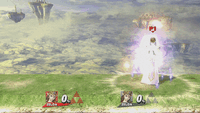
|
|---|
Taunts
- Up taunt: Holds one arm straight up while assuming an elegant pose and having her hand infused with magic.
- Side taunt: Turns toward the screen, puts her hands together in front of her torso, and then conjures Din's Fire between them.
- Down taunt: Leans forward and waves while smiling.
| Up taunt | Side taunt | Down taunt |
|---|---|---|
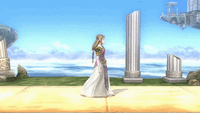
|
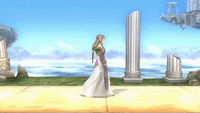
|
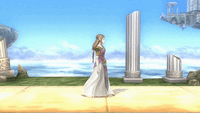
|
Idle poses
- Strokes the back of her hair.
- Loosely holds one arm and then looks around.
- With one hand on her elbow, she puts one hand on her neck, puts it back down and then taps her arm with one finger.
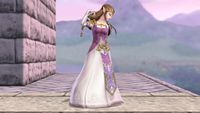 |
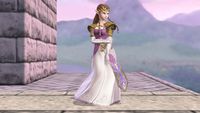 |
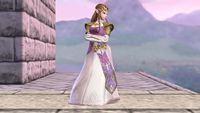
|
|---|
Crowd cheer
| English | Japanese | |
|---|---|---|
| Cheer | ||
| Description | Zel-da! | Zel-da! |
| Pitch | Group chant | Group chant |
Victory poses
- Clasps her hands together, which are briefly infused with magic, as if praying. She then turns her head upward and looks toward the sky.
- Turns her head to the left and loosely holds one arm with the other to pose in an elegant stance. At the end of the animation, she will smile while either
 looking into the distance, or
looking into the distance, or  looking at the camera.
looking at the camera. - Puts her hands together in front of her torso, conjures Din's Fire between them, and stares at it. It appears almost identical to her side taunt.
 |
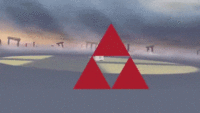 |

|
|---|
In competitive play
Official Custom Moveset Project
| Character | Custom sets available | ||||
|---|---|---|---|---|---|
| 1213 | 1313 | 1212 | 1312 | 1223 | |
| 1323 | 3212 | 3312 | 2213 | 2312 | |
Notable players
Any number following the Smasher name indicates placement on the PGR 100, which recognizes the official top 100 players in Super Smash Bros. 4 of all time.
Active
Bonren - Placed 17th at Super Smash Fight Club 3. Has wins over Elegant and Karna.
Casper - Formerly ranked 8th on the ACT Power Rankings.
Diamond - Ranked 10th on the Alberta Power Rankings.
Fairess - Placed 7th at Dubai X VGBootcamp with a win over Logic. Ranked 10th on the Kuwait Power Rankings.
Meru - Uses Zelda as a secondary. Placed 3rd at Valhalla and 9th at PPT Berlin using Zelda as one of his characters.
Onpu - The best Zelda player in Japan. Placed 17th at Umebura 27 and Umebura Tokaigi Qualifier 1; 33rd at Umebura Japan Major 2017; and 49th at Frostbite 2018.
Purple Guy - One of the best Zelda players in the world prior to his temporary retirement. Placed 13th at Smash the Record 2015, and 33rd at Paragon Los Angeles 2015. Formerly ranked 9th on the South Florida Power Rankings.
Rizeasu (#68) - Placed 2nd at Sumabato Tokaigi Qualifier 2 and 13th at Karisuma 16. He has wins over Kuro, ikep and Rain.
ven - The best Zelda player in the world. Placed 7th at DVDA 7; 13th at DVDA 8; 25th at Smash Masters League: Battle for Vegas 33rd at 2GGT: Mexico Saga; 49th at 2GGC: Nairo Saga and 2GGC: SCR Saga; and 65th at 2GGC: Civil War. Ranked 4th on the Las Vegas Power Rankings. He has wins over Venom.
Zolda - Formerly ranked 2nd on the Wisconsin Power Rankings.
Inactive
maXy - Formerly ranked 5th on the Ireland Power Rankings before dropping Smash 4 to focus on Melee.
Nairo - Placed 1st at Nebulous Prime 1 and 7th at KTAR XII before dropping Zelda. Has wins over ESAM and Nietono.
Riot - Formerly ranked 7th on the New Hampshire Power Rankings prior to his hiatus.
Tier placement and history
Unlike her ancestor in Melee and her own appearance Brawl, Zelda was immediately viewed as a non-viable character upon SSB4's release. This perception was because of the combination of her key flaws not being properly addressed, and Sheik becoming a standalone character who was buffed significantly in her own transition from Brawl. When coupled by her extremely minimal representation and results in competitive play, as well as players having yet to acknowledge Jigglypuff's status in competitive play, Zelda was ranked 56th on the first tier list, placing her at the bottom of the entire tier list.
Much like a number of other poorly perceived characters, Zelda received a multitude of buffs from game updates. These improvements contributed to her results slowly improving as time passed, most notably thanks to ven. However, Zelda's newfound buffs were still overshadowed by her inherent flaws, as well as the greater significance of buffs gained by other low-tier and bottom-tier characters. To reflect this, Zelda was ranked 55th on the second and third tier lists.
As of the fourth tier list, Zelda has been ranked 53rd, tying her with Ganondorf as the second lowest ranking character on the entire list. Unlike previous lists and her current placement in Brawl, this placement actually renders Zelda as a low-tier character, owing to this list's exclusion of the Mii Fighters and tier restructuring. Although Zelda's current placement is generally viewed as accurate, some players claim that she is relatively underrated; ESAM, in particular, ranks her higher on his own personal tier list.[4]
Trophies
- Zelda
This is the Zelda they're talking about in the titles of all the Legend of Zelda games. Though her appearance can change from game to game, her importance in the story usually doesn't. In this game, she's a bit slow, but her impressive magic skills make up for it. Power up her brand new special, Phantom Slash, by holding down the button.
- Zelda (Alt.)
Zelda's forward air attack, Lightning Kick, is a single-footed, electrically charged strike. Hit your opponent with just the glowing spot to deal heavy damage and launch them. Her Din's Fire side special can be guided up and down, and makes a bigger blast the longer you hold the button. It'll explode as soon as you let go.
- Light Arrow (Zelda)
- In many of the Legend of Zelda games, the sacred Light Arrows are required to defeat the final boss. In this game, Zelda fires one straight across the screen for her Final Smash. If it passes through multiple foes, the ones hit first will take the most damage. The Light Arrow has a lot of launching power, making it great for getting KOs!
In Event Matches
Solo Events
- All-Star Battle: Melee: Zelda is one of the opponents fought in this event. All of the opponents debuted in Melee.
- Identity Crisis: As Sheik, the player must defeat Samus. After defeating her, the player must defeat Zero Suit Samus. Zelda can appear if Sheik is KO'd.
- Princess Punch-Up!: Zelda and Link must defeat Peach and Mario.
- The Demon King and the Goddess: As Ganondorf, the player must initially defeat Link and Zelda. After the two are defeated or some time has passed, a giant Palutena appears and the player must defeat her as well.
- Unwavering Chivalry: As Meta Knight, the player must defeat Marth without defeating Peach or Zelda. Defeating either of the princesses results in a failure.
Co-op Events
- Peach in Peril: Zelda is one of the opponents Bowser and Bowser Jr. must defeat without KOing Peach.
- The Ultimate Battle: Two players choose a character and must defeat everyone on the roster.
Alternate costumes

| |||||||

|

|

|

|

|

|

|

|
Gallery
Zelda's amiibo.
A head shot of Zelda in Super Smash Bros. for Wii U.
Zelda and Link in Super Smash Bros. for Nintendo 3DS.
Using Phantom Slash, her new down special, on Fox.
Zelda on Skyloft.
Alongside Donkey Kong.
Zelda teetering as Rosalina & Luma look on.
Zelda looking at a prone Link.
Zelda looking at Link and Peach from a distance.
Zelda facing Toon Link.
Using Farore's Wind alongside Samus, who is in her Morph Ball form.
Zelda hanging on the edge of Battlefield while Link and Peach are in the background.
Preparing to use her forward tilt against Marth's forward smash.
Alongside Olimar and a Yellow Pikmin.
Alongside Peach and Rosalina on Mario Galaxy.
Zelda's pose when using Din's Fire.
The end of her forward tilt in Super Smash Bros. for Nintendo 3DS.
Posing in Super Smash Bros. for Nintendo 3DS.
Taunting alongside King Dedede and Peach.
Alongside a stunned King Dedede.
Fighting Rosalina on Reset Bomb Forest as Viridi appears in the background.
Using Phantom Slash against Yoshi's forward tilt.
Alongside Sheik.
Zelda being attacked by a Polar Bear in Smash Run.
Zelda taunting at the Bridge of Eldin.
Trivia
- Zelda's dress behaves differently in both versions of SSB4. In Super Smash Bros. for Nintendo 3DS, her dress flows less freely via having set forms in accordance to the attacks she performs. Conversely, her dress flows more freely in Super Smash Bros. for Wii U, which results in her legs clipping through her dress in different ways, and can be affected by certain wind-based physics on certain stages.
- Zelda's alt. trophy in Super Smash Bros. for Nintendo 3DS appears very similar to her ancestor's All-Star Mode trophy in Super Smash Bros. Melee.
- In Super Smash Bros. for Wii U, one of the tips about Phantom Slash refers to the Phantom using masculine pronouns: "If the Phantom takes 13% damage or more, he'll be destroyed. After that, you'll have to wait six seconds before summoning him again."
- Ironically, despite being revealed at the same time The Legend of Zelda: A Link Between Worlds was released, said game would eventually inspire her current design as of Ultimate.
- Zelda is the only playable character in SSB4 to have an alternate costume that inspired her default design in a subsequent Super Smash Bros. game. In this case, her incarnation from A Link Between Worlds (with some design elements of her incarnation from A Link to the Past) succeeds her Twilight Princess incarnation as of Ultimate.
- Her Twilight Princess incarnation would become the basis of an alternate costume in Ultimate.
- Due to her remaining as her Twilight Princess incarnation, SSB4 is the only game where Zelda retains her design from a previous game.
- SSB4 is the final game where Kirby's Zelda hat resembles Young Zelda's headdress from Melee, even though Zelda's Twilight Princess incarnation succeeded her ancestor from Ocarina of Time as a playable character as of Brawl.
- SSB4 marks the final appearance of Zelda as a starter character.
- SSB4 marks the final time Jun Mizusawa voices Zelda, who had voiced her since Melee.
- Originally, Zelda was still going to turn into Sheik in this game and vice versa, but the two characters were split apart instead due to the limitations of the Nintendo 3DS. A similar issue was also the case for Samus and Zero Suit Samus when their Final Smash was concerned, and Pokémon Trainer, who was dropped in favor of his Charizard operating on its own.
- Coincidentally enough, a figurine of Zelda by First Four Figures based on her design from Twilight Princess (which inspired her design in Brawl and SSB4) for some reason is colored more like her appearance in this game than in her source game proper (for example, the tapestry on her dress is colored differently, being indigo instead of gray like in the actual game), surprisingly enough, even in her possessed form during the final battle in that game (which also got her own figurine as well).
- Wii U is the only Smash game where Zelda's Ocarina of Time design (which based her design in Melee) is not directly referenced, despite 3DS featuring a trophy based on her appearance in that game.
References
| Fighters in Super Smash Bros. 4 | |
|---|---|
| Veterans | Bowser · Captain Falcon · Charizard · Diddy Kong · Donkey Kong · Dr. Mario · Falco · Fox · Ganondorf · Ike · Jigglypuff · King Dedede · Kirby · Link · Lucario · Lucas · Luigi · Mario · Marth · Meta Knight · Mewtwo · Mr. Game & Watch · Ness · Olimar · Peach · Pikachu · Pit · R.O.B. · Roy · Samus · Sheik · Sonic · Toon Link · Wario · Yoshi · Zelda · Zero Suit Samus |
| Newcomers | Bayonetta · Bowser Jr. · Cloud · Corrin · Dark Pit · Duck Hunt · Greninja · Little Mac · Lucina · Mega Man · Mii Fighter (Mii Brawler · Mii Gunner · Mii Swordfighter) · Pac-Man · Palutena · Robin · Rosalina & Luma · Ryu · Shulk · Villager · Wii Fit Trainer |
